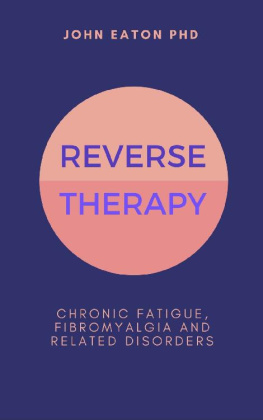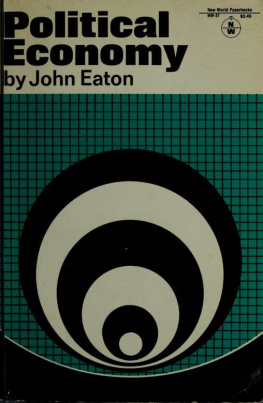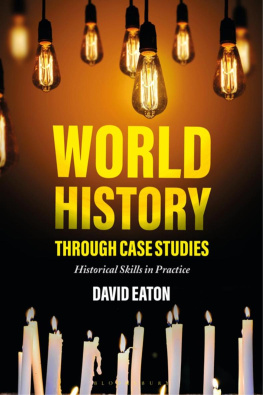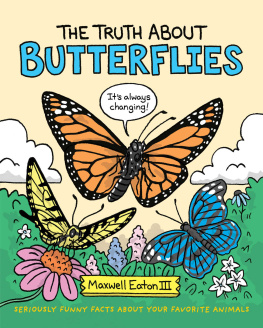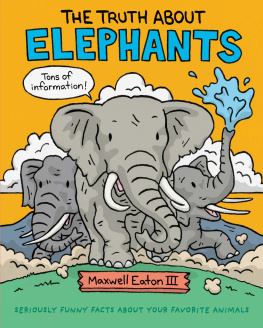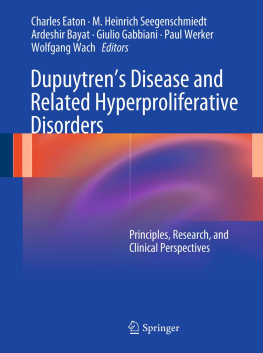John Eaton - Reverse Therapy
Here you can read online John Eaton - Reverse Therapy full text of the book (entire story) in english for free. Download pdf and epub, get meaning, cover and reviews about this ebook. year: 2017, publisher: Dr John Eaton, genre: Romance novel. Description of the work, (preface) as well as reviews are available. Best literature library LitArk.com created for fans of good reading and offers a wide selection of genres:
Romance novel
Science fiction
Adventure
Detective
Science
History
Home and family
Prose
Art
Politics
Computer
Non-fiction
Religion
Business
Children
Humor
Choose a favorite category and find really read worthwhile books. Enjoy immersion in the world of imagination, feel the emotions of the characters or learn something new for yourself, make an fascinating discovery.
- Book:Reverse Therapy
- Author:
- Publisher:Dr John Eaton
- Genre:
- Year:2017
- Rating:5 / 5
- Favourites:Add to favourites
- Your mark:
- 100
- 1
- 2
- 3
- 4
- 5
Reverse Therapy: summary, description and annotation
We offer to read an annotation, description, summary or preface (depends on what the author of the book "Reverse Therapy" wrote himself). If you haven't found the necessary information about the book — write in the comments, we will try to find it.
Reverse Therapy — read online for free the complete book (whole text) full work
Below is the text of the book, divided by pages. System saving the place of the last page read, allows you to conveniently read the book "Reverse Therapy" online for free, without having to search again every time where you left off. Put a bookmark, and you can go to the page where you finished reading at any time.
Font size:
Interval:
Bookmark:


Copyright Dr John Eaton 2017, 2021.
This work may not be copied, distributed or sold to any other party without the express permission of Dr John Eaton. You may not use this work for commercial purposes, or alter, transform or build upon this work without the permission of the copyright-holder.
To Contact John Eaton:
Email:
Post: 4 Church St., Kintbury, Berkshire. RG17 9TR UK
Reverse Thinking Blog: www.reversethinking.co.uk
Reverse Therapy Site: www.reverse-therapy.com
In Memoriam
Milton Hyland Erickson
1901-1980

Dr John Eaton PhD has been practising since 1990 and is a registered psychotherapist with the United Kingdom Council for Psychotherapy. Between 1996 and 2002 he developed the ideas, principles and techniques that became Reverse Therapy. He gained his doctorate in Psychology from the University of Lancaster in 1998. He has written numerous books and articles on Reverse Therapy, psychotherapy, coaching and emotional intelligence.
He lives and works in Kintbury, Berkshire with his wife and family.
To Contact John:
www.reverse-therapy.com
A client of mine has just left me with renewed hope by the perspective that I shared with him on his Chronic Fatigue Syndrome. He realised he could now take the initiative and get well. So what had I shared? The perspectives that John has developed over years of clinical practice, and which he has generously captured in his latest book.
Reverse Therapy remarkably takes us through a journey that touches on autobiography, a portrait gallery of influential thinkers on the operation of the mind, his own clinical experience, and finally a practical guide to how the process works. The reader can dip into different sections. The earlier sections provide the foundations for the all-important second half.
The writing is clear, and the advice is explicit, but this underplays the understanding, the almost prophetic insights of the writer. It takes courage to go against received wisdom on Chronic Fatigue Syndrome, Fibromyalgia and similar disorders. What is shared in the book is rooted in evidence; there is no requirement to sleep with your head aligned to magnetic north or adopt an idiosyncratic diet. Rather, this is evidence related wisdom from a man who has taken the time to step back from the battlefront, reflect and devise a different path. Of course, the critical factor is that it actually works!
The book provides tools not only for starting living again, but also tools for lifes journey. I would suggest that whilst the book has an understandable focus on specific complaints, it should be mandatory reading for all of us who want improved emotional and physical health.
This is a book to be read by health-care professionals, counsellors, psychotherapists, psychiatrists and the afflicted themselves. For those who suffer, what is there to lose? Perhaps just months and years of confusion and misery.
Dr. Max Coates, London University (Institute of Education).
I first met Harriet when she came to my office, telling me she had been ill with Chronic Fatigue Syndrome (CFS) for seven years. She did not look well: drawn, haggard and weary. That was not surprising given her constant fatigue and pain, to mention but two symptoms. She was 33 but had been in so much pain over the past few years that she was now partly house-bound.
Although she had been diagnosed with CFS six years before, she thought the fatigue had been there on and off since she was a teenager. As she told me her life-story, some facts became apparent.
Harriets parents separated when she was 12, and she lived with her mother and older sister. Her mother was a cold, hard woman who shouted at her whenever she did something wrong. Her sister was a few years older and attended another school, but they were never close. She always felt alone, and that life was too much for her, particularly school. She recalled her first menstrual period and being frightened by the blood (her mother had neglected to explain about puberty) and thinking she had some desperate illness, yet scared to tell anyone. When she confided in someone she thought was a friend, the other girls ridiculed her. That incident confirmed that it was best to keep her troubles to herself.
Although she was considered bright, she struggled with her GCSEs and A Levels. She recalled feeling anxious much of the time that she would never get the grades her mother and her teachers expected (her sister had gone to Oxford to study Medicine and it was assumed Harriet would do the same). Whenever she had to write an essay, or revise for an exam, she would worry and lose sleep; whenever she got less than top marks, she would dread her mother berating her. In the end she only got one top grade at A level, an outcome over which she experienced a lot of guilt, but she did get a place at a good university, studying law.
She felt just as lonely at university as she had at sixth form. She had few friends and was cripplingly shy. Nor did she find it easy to talk to her tutors when she struggled with course-work. The fatigue worsened and (thinking it was tiredness) she found it hard to get out of bed. She found it difficult to concentrate on her work, missed lectures, and took more time off sick. She went home for a few weeks but did not get well and felt worse after her mother told her to pull yourself together and get on with it.
Through sheer persistence, and with some luck she achieved a second-class degree in law which, while not perfect, at least enabled her to get a job in a Solicitors office as a trainee specialising in property law. She moved to London and started work. One of the other trainees at the office offered her a room in a shared house with two other women, with all of whom she made friends. Slowly life got better. For a while her fatigue and brain fog went away entirely. After a year or so of this hard-working, but pleasant life she met a man to whom she was attracted, and began a relationship with him which lasted on-and-off for four years.
As she came closer to taking her professional exams, the symptoms resurfaced. This threw her into a panic as she was also managing a large portfolio of clients and she worried she would not qualify, or stay at the firm, if she became so ill that she could not work. But her worries only seemed to make the symptoms worse. None of the medical doctors she consulted seemed to know what was wrong with her. Nor did the many blood tests she underwent reveal anything amiss. One doctor offered her anti-depressant drugs, but when she asked what good they might do the doctor shrugged and said there was nothing else he could offer. Harriet gained the distinct impression that this doctor thought that her illness was all in her head, a view her mother repeated with enthusiasm whenever she came to dinner. The idea that she was a malingering nuisance added still more to her isolation and fear, and still the symptoms worsened.
Her boyfriend, James, had always been an easy-going man but he, too, became impatient with her constant anxiety and panic, and with what he saw as the stop-start nature of her illness, in which one day she could go out with him, but the next spent in bed. By degrees he spent less and less time with her and rarely answered her calls. After one terrific row which followed his admission that he was dating other women, Harriet noticed a sharp, stabbing pain in her chest, and aching arms and legs. Shortly afterwards the relationship ended, but the pain did not go.
Font size:
Interval:
Bookmark:
Similar books «Reverse Therapy»
Look at similar books to Reverse Therapy. We have selected literature similar in name and meaning in the hope of providing readers with more options to find new, interesting, not yet read works.
Discussion, reviews of the book Reverse Therapy and just readers' own opinions. Leave your comments, write what you think about the work, its meaning or the main characters. Specify what exactly you liked and what you didn't like, and why you think so.

